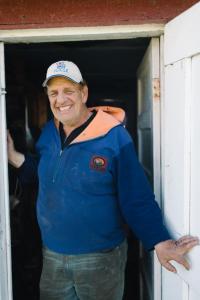Weston Fields

West Side Stories
These oral histories chart the personal stories of individuals with a longtime connection to the west side of Kodiak Island, defined for the scope of this project as the area buffeted by the Shelikof Strait that stretches from Kupreanof Strait south to the village of Karluk. The project endeavored to create historical primary source material for a region that lacks substantive documentation and engage west side individuals in the creation of that material.
Weston Fields was interviewed by Anjuli Grantham at Bear Island, Uyak, Alaska, on July 31, 2015, as part of the Kodiak Historical Society’s West Side Stories project. Weston was born in Long Beach, California, in 1948 and moved to Kodiak with his family when he was one. Although they moved to work at a church in Kodiak, his father, and the family soon switched to seining, beach seining, and eventually setnetting. He explains how they bought their site from a local at a time that buying or leasing was only just beginning and how setnetting became increasingly popular after the fish trap ban and statehood. He discusses the history of fishing and ithe ntricacies of different methods and gears as they changed over time. He recalls many of the fishermen of the past, his father’s efforts at raising cattle, the impact of the 1964 earthquake and tsunami on different areas of Kodiak, and the Alaska Native Claims Settlement Act. He also describes how he became part owner of Larsen Bay cannery and developed his own salmon seafood label, and his relations with other canneries.
Please Note: The oral histories in this collection are protected by copyright and have been created for educational, research and personal use as described by the Fair Use Doctrine in the U.S. Copyright law. Please reach out Voices@noaa.gov to let us know how these interviews are being used in your research, project, exhibit, etc. The Voices staff can help provide other useful resources related to your inquiry.
The NOAA mission is to understand and predict changes in climate, weather, oceans, and coasts, to share that knowledge and information with others, and to conserve and manage coastal and marine ecosystems and resources. The Voices Oral History Archives offers public access to a wide range of accounts, including historical materials that are products of their particular times, and may contain offensive language or negative stereotypes.
Voices Oral History Archives does not verify the accuracy of materials submitted to us. The opinions expressed in the interviews are those of the interviewee only. The interviews here have been made available to the public only after the interviewer has confirmed that they have obtained consent.
